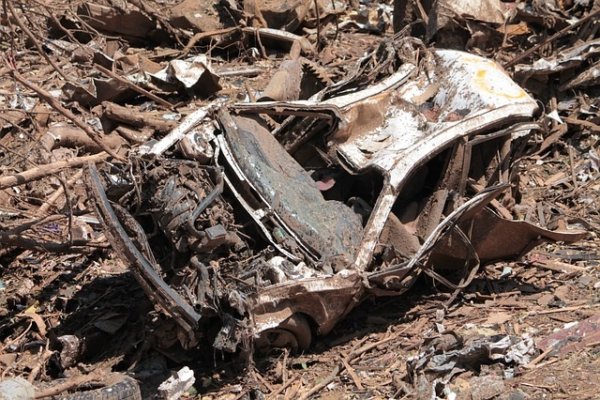
Here at Emergency Plan Guide we don’t really focus too much on being prepared for when it’s time to evacuate. Rather, we spend most of our time and energy investigating ways to prepare for and to shelter in place after a disaster. For example . . .
- Last week we talked about ways to store water, particularly if you have advance notice.
- Several times over the summer we talked about being ready for power outages, including using solar technology as an alternate source.
- And of course the July 5th earthquake generated a couple of Advisories about what might happen in the aftermath of a bigger one.
And then, two weeks ago, Hurricane Dorian hit the Bahamas.
And we witnessed images like the one above, only far more vast in scale and far more dramatic. I have to assume you asked yourself the same question I asked myself:
“What good did a stash of emergency supplies of water and canned beans do for these people, whose homes were leveled?“
The inescapable truth is that some disasters are so terrible, so violent, that just coming out alive is all you can hope for.
Still, Hurricane Dorian both in the Bahamas and in the U.S. reminded me about other aspects of preparedness that we may not think about often enough. Have you considered them in YOUR planning?
There is a time to evacuate.
Many of the residents of the Bahamas did not evacuate, even in the face of the predictions. Why not? Here are some of the comments I culled from news reports.
- Bahamians are “used to riding out storms.”
- By the time people realized the storm was a category 5, it was too late to do anything.
- The government issued watches and warnings but did not issue a mandatory evacuation order.
Dorian moved from the Bahamas to the east coast of the U.S. Over a million people followed recommendations to evacuate, but others in the U.S. did not evacuate, either. Why not?
- Some people were losing work because everything had already been shut down. They couldn’t afford the expense of evacuating.
- Some had no means of transportation.
- Others thought their homes could withstand the storm.
So here are evacuation questions for you, your household and your neighbors.
(1) Are you aware? Are you prepared with battery or solar-operated radios so you know the status of approaching storms, even when the power is out? There’s no good excuse for not knowing what’s coming. And, of course, is your car always half-full of fuel?
(2) Do you agree there may be a time to evacuate? Are you agreed that at some point it will be time to evacuate – and have you figured out who will make the call? Or are some people in your household unwilling to leave, for whatever reason? (Pretty tough to leave some people behind!)
(3) What route will you take? Do you know HOW to evacuate? That is, what roads you can take and which to avoid? What bridges are likely to be out?
We’ve talked before about having a map of your community and area so that you can find alternate routes when main routes are blocked. Of course, heading off through an unknown neighborhood could put you in danger of flooded roads, etc. Again, stay tuned to official channels to know which routes are being monitored.
It’s possible, of course, that you will have only one route, and in an emergency it could look like this . . .

(4) Do you need to plan to leave early? If you live in one of the U.S. cities that has limited evacuation routes, your plan must include leaving well BEFORE the order is called. Here’s an article that actually lists the worst cities for evacuating ! (Click the link within the article to see the full listing of the 100 evacuation-challenged cities.)
(5) Do you have money? Finally, do you have money set aside to allow you to evacuate? You will need to pay for gas, for food and lodging and perhaps other supplies. It could easily add up to hundreds of dollars a day until you get to where you’re going, even if it’s to out of town relatives. And then, you’ll have to come back.
We’re working on a more detailed look at the financial aspect of emergency preparedness. In the meanwhile, if you live in areas that could be threatened by natural disasters like storms, fires or hurricanes that would force you to evacuate, consider stashing some cash in your survival kit (along with important ID and/or travel documents).
Hurricane Dorian was an historic category 5 storm. But any hurricane or rain storm or approaching fire could require you to make a decision to evacuate. Are you really ready?
Virginia
Your Emergency Plan Guide team
Don't miss a single Advisory.
Thank you for subscribing.
Something went wrong.
